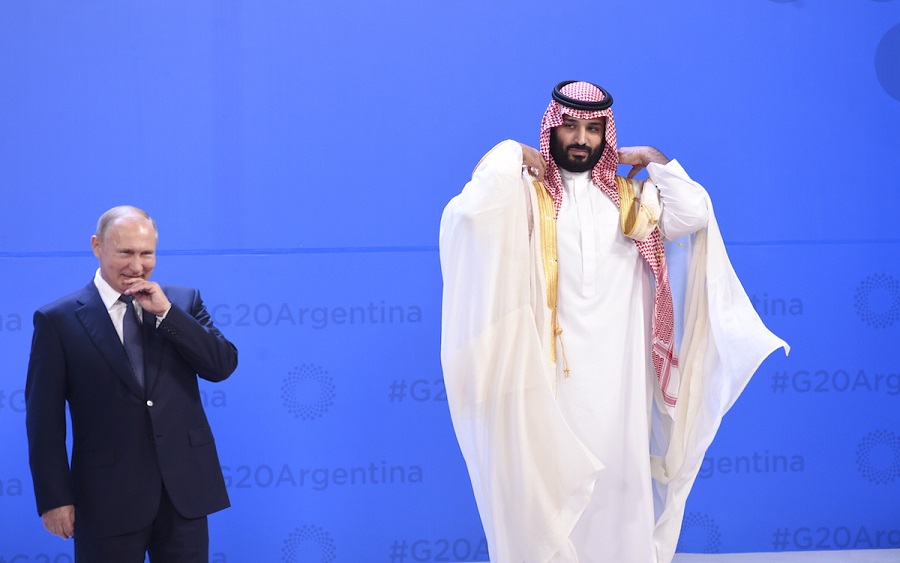Russia and Saudi Arabia have been best of friends, strengthened by the bilateral trade agreement between Riyadh and Moscow June 2018 and recent co-operation to restrain global oil supplies to keep prices buoyant.
However, in recent days, the treaty seems to have been thrown into the dustbin, as Russia and Saudi Arabia are in for a prolonged oil-price conflict.
Oil prices slumped by the most since 1991 on Monday. The commodity rebounded on Tuesday trading session but remained well off its early 2020 levels as uncertainty in the global financial market persisted.
Saudi Arabia escalated its fight on Tuesday, stating its state-owned Aramco could push its total output to a record 12.3 million barrels per day starting the second quarter 2020.
READ MORE: Nigeria plans to support oil price with lower production cost per barrel)
The supply increase would be more than 25% higher than the 9.7 million barrels per day produced in February and force Aramco to empty its sizable inventories while operating at maximum capacity.
Russia fired back in minutes, threatening to raise output by 500,000 barrels per day in the near future, Bloomberg first reported. The country can begin output increases as soon as April 1, when the current OPEC deal expires.
Helima Croft, head of global commodity strategy at RBC Capital Markets spoke on CNN saying Russia has been dropping hints that the real target is the US shale oil producers and not emerging markets like Nigeria because it is fed up with cutting output and just leaving them with space.
In addition, the rattle of the two oil giants, Russia and Saudi Arabia has caused fiscal woes. Africa’s biggest oil producer, Nigeria, which needs oil prices to be around $57 a barrel to balance its budget, is vulnerable to low oil prices as it depends on the commodity for 90% of its export earnings.
The Director-General of Lagos Chamber of Commerce and Industry (LCCI), Muda Yussuf said there would be constraint in the budget implementation; infrastructure financing would be affected; borrowing might increase, and the capacity to fund the capital project would be severely constricted. With this scenario, the outlook for oil-dependent economies looks rather gloomy.
The oil price shock would hurt Nigeria’s fragile economic recovery and push up inflation, already in double digits.
Nigerian stocks on Thursday headed for their fifth straight day of losses to a new four-year low, and a fall in oil prices to just over $30 per barrel, rising external debt and a depreciating currency pose a threat to economic stability in the country of more than 190 million people. Nigeria is Africa’s largest economy in terms of GDP
Head of Research at Coronation Merchant Bank, Guy Czartoryski stated, “We began this year with the view that the Naira/US dollar exchange rate could hold for most of 2020.
“When the coronavirus outbreak became apparent at the end of January, we still believed that a combination of monetary stimulus in developed markets and foreign portfolio investment into Nigeria would stabilize the risk outlook. Last week’s crash in oil prices, however, elevates risks considerably.”
The NNPC boss, Mele Kyari, stated that with the oil market slump on Monday, the reality on the ground was beginning to dawn on the country. He also buttressed on the fundamentals in the oil economy, at the CBN Growth 2.0 buttressed the effect of oil price war, has done on our earnings, and that Nigeria would start making losses in oil production once the level got below the cost to produce pegged at $30.
READ ALSO: BOOM: Crude oil price crash below $30 in worst trading day since 1930
In addition, it’s looking gloomier for Nigeria in the oil sector as the United Arab Emirates, OPEC’s third-biggest producer joined the oil price war started by Saudi Arabia.
What it means for Nigeria: OPEC’s fifth producer, the benchmark oil price of $57 governing the 2020 budget becomes more and more unrealistic as oil has fallen to $35 range and may even fall further with the oversupply from the Gulf region. Brent Crude traded down $1.65, or 4.6%, at $34.14 by around 08.18 am Thursday Nigerian time.
Nigeria’s economy is already facing turbulent times over the drop in crude oil prices to $35 per barrel on Friday.
The impact of the oil price war on Nigeria’s foreign reserves, exchange rate stability and equities market will show a devastating effect on its economy.
These scenarios could lead multilateral institutions to revise downwards their 2020 projections on Nigeria’s growth. It is believed that with growth in Gross Domestic Product still fragile and foreign portfolio investment inflows low, Nigeria needs more than sound economic policies to pull out of the crisis it is already settling into.
